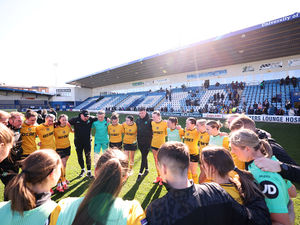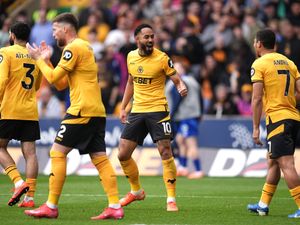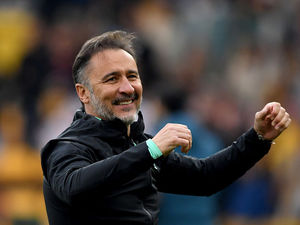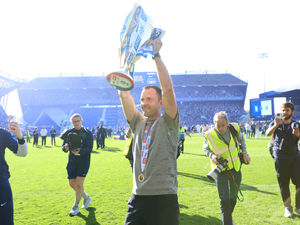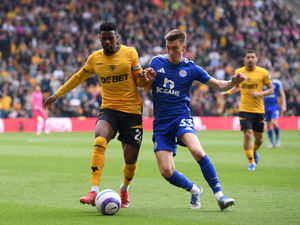A proven international but a switch to Wolves just didn’t work out for Isaac Okoronkwo
The sense of anticipation around Wolverhampton was palpable.
Magical memories of the Millennium Stadium, and the open-top bus tour around the city, still lingered gloriously in the air.
Promotion to the top flight almost two decades after last appearing there had provided moments and experiences to last a lifetime.
And now, just who would Wolves sign?
England internationals David James and Trevor Sinclair had been lined up by Dave Jones. Even Teddy Sheringham and Patrick Berger were mentioned in despatches.
Arsenal’s defensive stalwart Oleg Luzhny, a free agent, was the first to arrive, ironically and unfortunately spotted at Molineux on the day a lunch was being hosted for the media to discuss Premier League plans.
Then a press conference was announced, and excitement hit fever pitch.
Speculation even reached local television news that Dutch legend Dennis Bergkamp was on the radar, although reports he had been spotted in the frozen food aisle at ASDA would later prove unsubstantiated.
As it was, the media corps headed to RAF Cosford where Wolves were training for part of pre-season in 2003, to be met by the sight of Nigerian defender Isaac Okoronkwo joining Jones and CEO Jez Moxey on the podium.
On paper, Okoronkwo was actually an excellent signing.
Arriving as a free agent at the age of 25 having spent three years with Shakhtar Donetsk in the Ukraine, the centre back was also a regular in the Nigerian national team. He would eventually earn 26 caps.
A one-year deal seemed sensible enough given Okoronkwo was moving to a new country, and Wolves to a new division. A sort of extended ‘look-see’ over the duration of a Premier League campaign.
With Joleon Lescott suffering from injury problems, Okoronkwo was added to the central defensive department of a squad which included the experience of Jody Craddock and Paul Butler, and he was ready to increase the competition for places.
It wasn’t his fault that perhaps supporters had been expecting a more established Premier League name.
“That was a big day for me,” Okoronkwo recalls of that Cosford press conference.
“I remember meeting the club’s management and the media and I was excited and looking forward to the challenge.
“Every Nigerian player wants to come and play in England if they get the chance, and I was no different.”
As it transpired, Okoronkwo would have to wait a very long time for that chance.
Having travelled over in early July to put pen to paper and face the media he had to return to finish off the campaign with Shakhtar, and missing a chunk of pre-season wasn’t the ideal preparation for a first crack at the Premier League.
A debut arrived in the Carling Cup win against Darlington in late September, but Okoronwko wouldn’t figure again for Wolves until making his Premier League bow against Manchester City at the Etihad in April.
Injury, and helping Nigeria to third place in the African Cup of Nations in Tunisia, played a part in limiting his opportunities, but, having waited patiently, that 3-3 draw was the first of seven successive appearances in the starting line-up.
Wolves eventually ran out of time and, despite an improvement sparked largely by a promising understanding between Henri Camara and Carl Cort up front, an immediate relegation back to the Championship was sealed.
When it comes to the long wait, 202 days to be precise between his first and second Wolves appearances, Okoronkwo remains fairly philosophical, even now.
“I’m still not completely sure why I wasn’t given an opportunity earlier, but I was still a young player at that time,” he explains.
“Bolton and Newcastle had both been interested, but with my agent we had actually thought it was good to go to Wolves, that I might get the chance of more games.
“And the one year contract seemed good – Wolves were trying to adapt to being in the Premier League and I was trying to adapt to football in a new country.
“But I was 100 per cent I could come in and play and confident I could show I was good enough and then either renew my contract or move to another club.
“It just never happened.
“I struggled a bit with the ideas of the coach, I got a hamstring injury which didn’t help and then I went off to the African Cup of Nations where I played the games but wasn’t at my best form.
“There were also times when I was fit but I wasn’t playing, but I had kept myself in good shape, and every day I was waiting for my chance.
“I was still playing for the reserves, and also coming in and training on my days off to make sure I was fit.
“In England, if you don’t play in the game you might do some running afterwards but then you are given the next day off, the same as the players who have been involved.
“That was different to how it had been for me in the Ukraine, if you didn’t play you would train the next day – I had that mentality and so a lot of times I would come in and train on my own or do some road work.
“Still I didn’t play, and it was difficult, because if I had been given a chance, and not done well, I could have understood it.
“I just got on with things and stayed in my routine and what I didn’t do was complain and fight with the coach – maybe I should have done!
“I thought I needed to be patient, he had signed me so he knew what I had to offer.
“I did confront him a couple of times, and he said I needed to keep working and wait for my chance.
“We had so many losses, and still I had to wait, but I really thought I could help the team.”
For Jones, as manager, it was a tricky proposition.
Wolves, having not strengthened sufficiently, had started the season poorly, and were always playing catch-up as a result.
In Butler, Jones had one of his on-field lieutenants, a strong dressing room influence, and in Craddock, who had also arrived in the summer, another experienced campaigner who would later show his Premier League mettle by being Wolves’ Player of the Year under Mick McCarthy.
Replacing either with Okoronkwo would have been a risk, but it’s one which the player felt was worth taking, particularly given his pedigree prior to arriving at Molineux.
Time playing in Nigeria, Qatar and Moldova preceded the spell with Shakhtar Donetsk, which itself featured two league titles, one domestic cup, and the Champions League, including a 3-0 win over an Arsenal team which featured a front-line of Henry, Wiltord and Kanu.
Okoronkwo had also represented Nigeria Under-23s at the Sydney Olympics in 2000, going on to become a regular at senior level for the Super Eagles, including at the 2002 World Cup in Japan and South Korea.
He was the only defender to play the entirety of Nigeria’s three group games at the tournament, including a 0-0 draw against an England team boasting a strike-force of Emile Heskey and Michael Owen.
So clearly the potential was there, and was perhaps shown in that finale to the season, as unexpected as it proved.
In those closing games Okoronkwo lined up against the likes of Robbie Fowler, Alan Shearer, and Wayne Rooney, but it didn’t faze him.
“I had played in a reserve game just before Man City, the full 90 minutes, so it was a bit of a surprise that I was selected,” Okoronkwo recalls.
“At least it meant I was ready, along with my extra training, and I thought it went o-k.
“Technically, coming up against those strikers, I had been used to that at Shakhtar, playing against Lazio, Arsenal, big teams in Germany, and also with the World Cup as well.
“So I was confident I would do well.
“Paul Ince had been great for me, telling me to wait for my chance, and that I could do it.
“And I had settled in Wolverhampton absolutely fine.

“The club looked after me, I could speak English, I had good people around me, and I adapted immediately.
“I had Nigerian colleagues in England at the time as well, Kanu at Arsenal, Joseph Yobo at Everton, Yakubu at Portsmouth, and I could go and meet them when I had the time.
“I enjoyed it, for Nigerians in England there is never a problem and in Wolverhampton you could even find Nigerian food – all I needed was to play!”
Okoronkwo forged friendships with others who had joined at a similar time such as Luzhny, Steffen Iversen and Silas and has fond memories of trips to Liverpool as a group for meals with Ince.
He remains in touch with Andrew Pearce, who worked with the club to find accommodation for new signings, and was also an international team-mate of Seyi Olofinjana, who would later move to Wolves as a player and is now involved as Player Loans and Pathways Manager at the club.
Okoronkwo also had the support of the fans.
Even now he remains something of a cult figure, perhaps linked to the brevity of his Wolves career.
“Wolverhampton brought me a lot of friends, they used to invite me to their houses even before I started playing!” he says.
“I think Wolves have some of the best fans in the English leagues I would say, they are up there.
“Even the season that I was there, we got relegated but they stayed with the team right to the very end.
“The stadium was always full, they still believed, and it was just unfortunate we couldn’t stay up.
“The fans were fantastic, and even over the last few years now, with the team doing so well, you can see how they are pushing them.
“Wolves is such a big club, a one city club, and you see it even more when they are doing well.”
Okoronkwo enjoyed it so much, that even though his entrance into the team was somewhat belated, he considered staying longer following the offer of a new contract.
“Yes I would have stayed, or even if I had a two year contract I would still have been at Wolves and would have tried to bring the team back up,” he explains.
“A new contract was discussed but the proposal wasn’t good.
“When my agent looked at it he thought it probably wasn’t good enough to show that they really wanted me, and so it was better to have a look and see what else was out there.”
Okoronkwo headed to Russia, where he also knew he would fit the style of play, and was a regular for Alania, FC Moscow and FC Rostov before hanging up his boots in 2013.
It was an excellent career, if perhaps tarnished only by not featuring more during his brief stay with Wolves.
There is, however, not an ounce of regret.
“Would I want to have changed my mind about coming to Wolves? No, not at all,” he says.
“I really enjoyed it, and after I left I kept coming back to England as my sister stayed in my house and I had other property interests.
“I could maybe have left when the window opened in the January when I hadn’t played but I am so glad I didn’t.
“I never wanted to leave without making my mark in the Premier League and at least I got to play some games in the end.
“I would make exactly the same decision now as I did then in coming to Wolves.
“Maybe I would have just done things in a different way.
“I was young then, and I did speak to the coach a couple of times but I think maybe I should have pestered and pestered and tried to convince him that I could have helped.
“Sometimes coaches don’t know everything that is going on and maybe sometimes you need to push them and try and persuade them and that is an experience I took on into the rest of my career.”
Okoronkwo’s post-football career has centred around property, and building on the investments he had already made during his time in England.
Living in Krasnodar in Southern Russia, he has a small company and purchases houses and flats near the end of construction and sells them on when completed.
He also rents out office and flats, including properties for players from overseas who join Krasnodar, who play in the Russian League.
Okoronkwo also has a hotel back in Nigeria, and he would normally head home twice a year to visit before the pandemic.
And then there is family life!
Hailing from a large family, with two brothers and four sisters, his own household is now extended after wife Cristina gave birth to their twins Eric and Kate eight months ago.
“Yes I keep very busy with work and the twins,” he confirms.
“It is good that we have been able to have children after I retired from football because it is always difficult when you are playing with so much travelling and moving around.
“It would have been difficult to handle twins in that situation – I would probably have run away from the house!
“Now I have more time available to spend with the family, to help my wife and play with the twins.
“I always thought it would be nice to have a family when I had finished playing and could concentrate on them more and I am really enjoying it.”
And who knows? Maybe one day the junior Okoronkwos will be able to make the trip and see just where Dad enjoyed a fleeting taste of life with Wolves in the Premier League.
“I have been back a couple of times to watch games at Wolves, and I still follow them now and watch them on television,” he says.
“They have done so well in the last few years and I am really happy to see that they played in Europe.
“They have become even more popular in other countries, and the Russian media are often talking about Wolves and their players.
“I am so happy that my name has been associated with Wolves, it is there on the teamsheets, and I got the chance to play for them.
“And when the pandemic situation is calm I would definitely love to come back to Wolverhampton again.
“Just to come into the stadium and look at it again will be a joy, and to remember all the memories from my time all those years ago.”
Maybe there might not quite be the same level of anticipation and excitement for Okoronkwo’s next visit as there was ahead of that very first one, but his final words show it is clear that time has not diminished the enjoyment of his year at Molineux.
“I am proud to have played for Wolves in the Premier League.”

